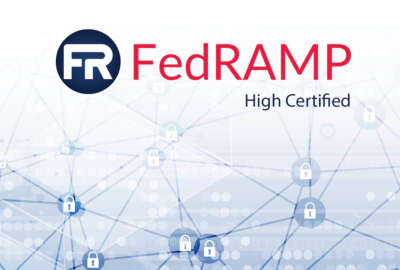Hubbard Radio Washington DC, LLC. All rights reserved. This website is not intended for users located within the European Economic Area.
GSA peels back the lid a little further on open government
The GSA has launched what it calls the Open Government Federal Advisory Committee.
Open government is a good idea, but you can never let up efforts to keep it what way. Now the General Services Administration has launched what it calls the Open Government Federal Advisory Committee. It has to do with the U.S. Open Government National Action Plan. Joining the Federal Drive to sort it out for us, GSA’s associate administrator for governmentwide policy, Krystal Brumfield.
Interview Transcript:
Tom Temin Now, this committee and we’ll get to the details here, is operating in support by the Open Government, the secretariat, program management Office. And there’s also the U.S. Open Government National Action Plan. Also, fairly recent developments. Maybe sort out the moving pieces here for us.
Krystal Brumfield Sure. So Open Government Secretariat is a new office, a new program office that was just established within my office, the Office of Government Wide Policy, just earlier this year. It’s an office that oversees the National Action Plan. So, the National Action Plan is in its fifth iteration. We are currently working on developing the sixth National Action Plan, and it’s simply the government’s commitment towards more transparency and accountability. And what steps we’re taking to get us there.
Tom Temin And what is in the fifth iteration that might not have been in the fourth or what’s how do they move this along each iteration?
Krystal Brumfield So each iteration is developed with, public input. And in this case we are developing or starting this better advisory committee so that we can get even more government input. And so, the agencies across the government help to develop the actions that are developed in the plan written in the plan. Each action plan is updated to reflect new commitments, across the federal government.
Tom Temin So this is a good example of where there’s a national policy. And often the white House will tap GSA to carry it out from a program standpoint.
Krystal Brumfield Exactly. And so, we, along with other agencies, have a commitment. But the office, for the secretariat is responsible for overseeing the commitment that’s carried out by each agency.
Tom Temin Got it. So, the secretariat then is a multi-agency type of thing?
Krystal Brumfield Absolutely. We work hand-in-hand with agencies across the federal government.
Tom Temin And let’s talk about then the main topic here, the Open Government Federal Advisory Committee. What is the composition or what will the composition of that be?
Krystal Brumfield So the composition will be, members of the, the public, including federal agency representatives, but civic organizations and individuals who are interested in how government works and how government can be a better partner, to the industry in the people that we represent. So, all stakeholders are welcome to nominate themselves or know the organization. We are looking for a cross-section of government and industry representatives, like I said, from federal agencies, but also from state and local government, as well as industry associations and academia.
Tom Temin Okay. Can individual citizens have a chance? Are there anybody that’s going to be just because of their eminence in in open government and access knowledge, possibly be on there?
Krystal Brumfield Absolutely. So, we’re soliciting nominations, as you know, for potential committee members right now. The solicitation and selection will be based off of a variety of requirements. But potential members, of various backgrounds and qualifications is what we’re looking for. So, we like to have a really a diverse representative of the country on this advisory committee.
Tom Temin And by the way, advisory committees exist in a lot of federal domains, and there’s even statutory requirements for how those are put together and operated.
Krystal Brumfield Correct. So federal advisory committees fall under the Federal Advisory Committee Act. So, the advisory committees can be statutory, as you said, which are created by Congress. Also, federal agencies can create, at their discretion, federal advisory committees, as well as the president, can also create federal advisory committees. As you probably have seen a couple of years ago with the Federal Advisory Committee that looked at the Supreme Court composition.
Tom Temin We’re speaking with Krystal Brumfield. She’s associate administrator for government wide policy at the General Services Administration. And will this group, when it’s finally established, meet, physically get together and talk face to face?
Krystal Brumfield So most of the meetings will be virtually. Whether we meet in person will be really based off of budget and making sure that we have an opportunity for everyone to participate. And so, we’re going to initially meet virtually so that people from across the country can participate in the meetings as well as the public can also watch the meetings because they are public meetings. And they’ll be announced in the Federal Register.
Tom Temin Yeah, in some ways, the technology has made open government itself. The idea of open government more open because of the very system you describe.
Krystal Brumfield Exactly. So open government is just that. We’re open. We’re open for input. We’re open for. Participation, as well as for the public just to view if they’re interested in doing so.
Tom Temin And give us an example of an element that might be in the National Action Plan that the committee might advise you.
Krystal Brumfield On. So, an element could be anything from how websites function and work. For instance, you know, log in.gov. It could have a range. And so, it could have something that’s really specific to the workings of GSA, to something that, for instance, EPA or the Department of Commerce does around technology. And so, it can vary. It depends on the agency. And each agency is, is, has to, has a commit to some form of, open government. And so, we’re working hand in hand with those agencies to get their commitments to include within the National Action Plan.
Tom Temin So the committee could have domain specific people say that no environmental matters, for example, or no international commercial matters, whatever the case might be for that particular way.
Krystal Brumfield So we can have subject matter experts to individuals who are representing a general trade association all the way to a specific sector in the society, and so civic organizations can and are an active part of the work that we have been doing. And I would anticipate that we would have more participation going forward from different societies, for instance, being a part of the federal advisory Committee, or at least interested in the work of the advisory.
Tom Temin Committee, and sometimes at its discretion, Congress will grant one of these types of advisory boards funds to have an executive director or someone to be on staff to make sure that the trains run. You have that luxury.
Krystal Brumfield So in this case, that’s it’s not a statutorily, mandated advisory committee. In fact, Administrator Carnahan decided to create the Open Government Federal Advisory Committee. But this is something that is not uncommon across government. Federal advisory committees exist for, various reasons. And they can cover a variety of different topics.
Tom Temin Right. So, this is all bootstrapped you might say.
Krystal Brumfield I wouldn’t say bootstrapped, but I will say that we found that it was necessary. And so, we found the resources to and the expertise because we also had we understood that we had the expertise in-house to stand up and advisory committee, but more importantly, Tom. I think we realized that it was important that we had an advisory committee to get the input from the public.
Tom Temin And what happens when, let’s say, the agenda item for a particular meeting, let’s just continue with the environmental example is an EPA gambit with respect to access to data, rulemaking, whatever the case might be. And the consensus of the committee is X-Y-Z. This is what is probably the best course of action for the agency. What happens then? What happens to that collected thinking?
Krystal Brumfield The purpose of the committee is for us to the government to receive those recommendations. And so, the committee itself, the committee members will meet on a regular basis. They’ll provide recommendations to the administrator, and we’ll take those recommendations to our colleagues, for instance, at EPA, for their development of their actions within the National Action Plan.
Tom Temin So it has a little bit of the flavor of rulemaking in that sense, in that you solicit information from the public, comments from the public. It’s not binding on the agency. It’s not a plebiscite. But yet most agencies take that into account before they make their final move.
Krystal Brumfield Absolutely, absolutely. So that’s the that’s the purpose is to get the input from industry, from academia, from state and local government, because that’s a critical part of how we develop our thinking behind the rulemaking that we make the policies that we develop. And in this case, the National Action Plan that we are, currently in development.
Tom Temin And any events on the immediate horizon, I guess the secretariat of GSA’s Open Government is going to be meeting publicly very.
Krystal Brumfield Soon. Yes. So, we are hosting a virtual public Q&A session on May 10th at 1:00 eastern, really, to talk about questions on the selection process and the timeline for this advisory committee. The committee members, of course, I, like I said, will be federal government, some from a private sector, civil society and academia. And for the advisory committee to be successful, we’re going to need to have a diverse make up to provide many different perspectives. I think that’s the beauty of it, and that’s how we will best meet the challenges and opportunities in open government space so that we can ensure that there’s democracy delivered for all. You know, many of those efforts are outlined in, currently in the National Action Plan, which is managed by this new Secretariat office. But specifically, this group is going to advise on those efforts so that we can continue to increase public access to information and data, as well as to advance equity so that we can engage more citizens through the regulatory process to make government, records more accessible. And. As well, and to improve the overall operations of how government actually delivers its services and its benefits. And so, we need expert advice in really all of these areas so that we can be successful.
Copyright © 2024 Federal News Network. All rights reserved. This website is not intended for users located within the European Economic Area.
Tom Temin
Tom Temin is host of the Federal Drive and has been providing insight on federal technology and management issues for more than 30 years.
Follow @tteminWFED
Related Stories
Related Stories
-
GSA’s new approach to small business matchmaking Contracts/Awards
-
GSA aims to make buying SaaS easier through new policy Acquisition Policy





